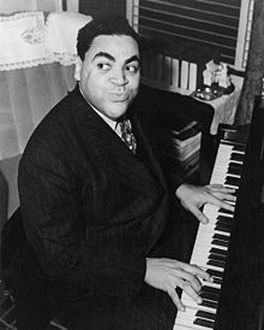 Fats Waller: BORN 1903; DIED 1943 Musical Selection: "Honeysuckle Rose", "Ain't Misbehavin' ", "Jitterbug Waltz" Thomas "Fats" Waller was not only one of the greatest stride pianists in jazz and an inspried small-group leader, but was also a world-class tunesmith, an equable and occasinally moving singer, and one of the most charismatic personalities to emerge in the music-entertainment business between the wars. Waller was born in New York City into a Baptist lay preacher's family; the young Fats played organ at this father's services and was given a thorough training at the keyboard by private teachers. By his mid-teens Fats was working as a professional in the local Harlem theaters. Wall's mother died in 1920 and he moved in with family friends; through them he James P. Johnson, who gave him a gilt-edged introduction into the world of Harlem stride piano. During the 1920's he began recording for Okeh as an accompanying most of the great acts appearing in New York cabaret at the time, including Bessie Smith. Waller benefited from association with Okeh's Clarence Williams, having some of his early compositions such as "Squeeze Me" published in 1923. By the late 1920s Waller had begun regularly appearing on local radio as a pianist and singer and had also met up with lyricist Andy Razaf. Together they began writing for various New York theater shows, including Keep Shufflin' (1928) and Hot Chocolates (1929). Songs such as "Honeysuckle Rose," "Ain't Misbehavin'," and "Black and Blue" made their debut in such productions before the end of the decade. During this time Waller began his association with the Victor record company, one which would survive until his death; some of this earliest sides for Victor were with Fats Waller's Buddies. He would record a varied program of music for Victor in the next few years, including solo piano pieces and duets such as "Handful of Keys" and "Smashing Thirds." Waller began traveling widely in ther early 1930s as well as assiduously making radio broadcasts, while playing in a number of different bands. He reached Europe for the first time in 1932, but the most significant musical development was the formation in 1934 of Fats Waller and his Rhythm, a band of varying size (but usally a sextet) most regularly featuring trumpeter Herman Autry, saxophonist Gene Sedric, and guitarist Al Casey. This band became his primary musical vehicle and he made literally hundreds of records for RCA Victor with them. These ranged from the low satire of "Big Chief De Sota" to the slapstick of "The Joint Is Jumpin'" to the melancholy of "My Very Good Friend The Milkman" to the gentle brilliance of "Jitterbug Waltz." Furing the 1930s Waller rose steadily in public profile to become one of the most well-known entertainers on radio and a constant presence in the charts. He toured constantly, sometimes sticking on the West Coast for a time, or in Chicago, but always using New York as his base. By mid-decade he was hearing the siren call of Hollywood, appearing in films until 1938 when he was one of the stars in Stormy Weather, with Lena Horne. Waller died in that winter on the trans-American railway en route to New York from a long engagement in Los Angeles, succumbing to pneumonia after registering symptoms prior to his trip. Waller is remembered for his ready burlesquing wit, but he had higher aspirations: in London in 1938 he recorded his London Suite, a set of six conceivable he would have produced considerably more such instrumental compositions.
0 Comments
Leave a Reply. |
Jazz LegendsA blog on the great legends in Jazz. Information via "The Encyclopedia of Jazz and Blues". Archives
December 2017
Categories |
 RSS Feed
RSS Feed

